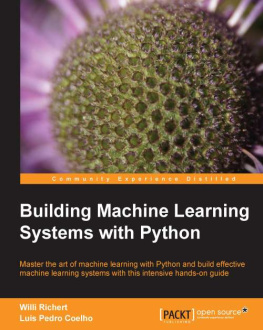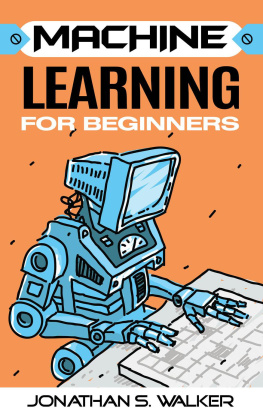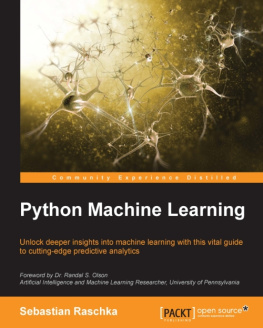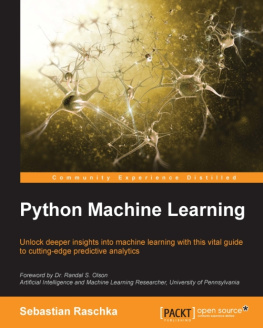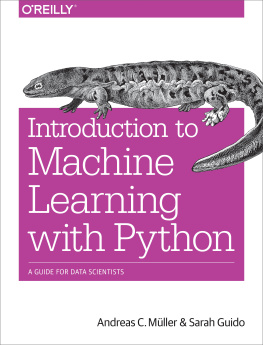Willi Richert - Building Machine Learning Systems with Python
Here you can read online Willi Richert - Building Machine Learning Systems with Python full text of the book (entire story) in english for free. Download pdf and epub, get meaning, cover and reviews about this ebook. year: 2013, publisher: Packt Publishing, genre: Computer. Description of the work, (preface) as well as reviews are available. Best literature library LitArk.com created for fans of good reading and offers a wide selection of genres:
Romance novel
Science fiction
Adventure
Detective
Science
History
Home and family
Prose
Art
Politics
Computer
Non-fiction
Religion
Business
Children
Humor
Choose a favorite category and find really read worthwhile books. Enjoy immersion in the world of imagination, feel the emotions of the characters or learn something new for yourself, make an fascinating discovery.
- Book:Building Machine Learning Systems with Python
- Author:
- Publisher:Packt Publishing
- Genre:
- Year:2013
- Rating:5 / 5
- Favourites:Add to favourites
- Your mark:
Building Machine Learning Systems with Python: summary, description and annotation
We offer to read an annotation, description, summary or preface (depends on what the author of the book "Building Machine Learning Systems with Python" wrote himself). If you haven't found the necessary information about the book — write in the comments, we will try to find it.
Master the art of machine learning with Python and build effective machine learning systems with this intensive hands-on guide
Overview
- Master Machine Learning using a broad set of Python libraries and start building your own Python-based ML systems.
- Covers classification, regression, feature engineering, and much more guided by practical examples.
- A scenario-based tutorial to get into the right mind-set of a machine learner (data exploration) and successfully implement this in your new or existing projects.
In Detail
Machine learning, the field of building systems that learn from data, is exploding on the Web and elsewhere. Python is a wonderful language in which to develop machine learning applications. As a dynamic language, it allows for fast exploration and experimentation and an increasing number of machine learning libraries are developed for Python.
Building Machine Learning system with Python shows you exactly how to find patterns through raw data. The book starts by brushing up on your Python ML knowledge and introducing libraries, and then moves on to more serious projects on datasets, Modelling, Recommendations, improving recommendations through examples and sailing through sound and image processing in detail.
Using open-source tools and libraries, readers will learn how to apply methods to text, images, and sounds. You will also learn how to evaluate, compare, and choose machine learning techniques
Written for Python programmers, Building Machine Learning Systems with Python teaches you how to use open-source libraries to solve real problems with machine learning. The book is based on real-world examples that the user can build on.
Readers will learn how to write programs that classify the quality of StackOverflow answers or whether a music file is Jazz or Metal. They will learn regression, which is demonstrated on how to recommend movies to users. Advanced topics such as topic modeling (finding a texts most important topics), basket analysis, and cloud computing are covered as well as many other interesting aspects.
Building Machine Learning Systems with Python will give you the tools and understanding required to build your own systems, which are tailored to solve your problems.
What you will learn from this book
- Build a classification system that can be applied to text, images, or sounds
- Use scikit-learn, a Python open-source library for machine learning
- Explore the mahotas library for image processing and computer vision
- Build a topic model of the whole of Wikipedia
- Get to grips with recommendations using the basket analysis
- Use the Jug package for data analysis
- Employ Amazon Web Services to run analyses on the cloud
- Recommend products to users based on past purchases
Approach
A practical, scenario-based tutorial, this book will help you get to grips with machine learning with Python and start building your own machine learning projects. By the end of the book you will have learnt critical aspects of machine learning Python projects and experienced the power of ML-based systems by actually working on them.
Willi Richert: author's other books
Who wrote Building Machine Learning Systems with Python? Find out the surname, the name of the author of the book and a list of all author's works by series.

